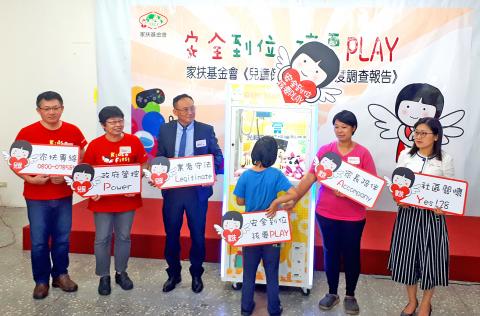More than half of children walk past one to five claw machines on their way to school and nearly 20 percent said they have seen merchandise that makes them feel uncomfortable in such machines, a Taiwan Fund for Children and Families survey found.
The number of claw machine stores has more than tripled from 920 in 2016 to 3,353 this year, Ministry of Finance statistics showed.
As such establishments become increasingly common, it is necessary to consider their effects on children’s physical and mental development, and the experiences they offer them, fund executive director Betty Ho (何素秋) told a news conference yesterday.

Photo: CNA
To better gauge their effects, the fund between April 25 and May 31 conducted an online survey on claw machines among children aged seven to 18 and collected 1,884 valid responses, fund social work section chief Chou Ta-yao (周大堯) said.
The survey found that 32.7 percent of children play a claw machine game one to three days per week, 6.8 percent play with one four to six days per week and 4.1 percent do it every day, Chou said.
While 52.9 percent said they walk past one to five claw machines on their way to school, 48.1 percent who play with them say they mostly do so over the weekend, he said.
Seven percent of children said they stay at a claw machine store — which are usually always open — past 10pm and 37 percent said they keep playing until they get the item that they want, he said.
While 19.7 percent said they have seen merchandise that makes them feel uncomfortable in claw machines, 4.9 percent said they have been harassed or bullied, or got into fights at a claw machine arcade, he said.
“Children have the right to engage in play and recreational activities appropriate to their age, as specified in Article 31 of the UN Convention on the Rights of the Child,” Ho said. “Playing allows children to cultivate their creativity and imagination, become more sympathetic, improve their dexterity and develop more confidence.”
However, children need guidance when playing to prevent harm and in the case of claw machines, because when unsupervised, some children might spend more money than they should, she said.
While there are strict laws and regulations governing the management of arcades and merchandise that can be displayed in public, such as the Electronic Game Arcade Business Regulation Act (電子遊戲場業管理條例) and the Protection of Children and Youths Welfare and Rights Act (兒童及少年福利與權益保障法), the survey showed that inappropriate merchandise can still be found in some machines, she said.
The government should step up enforcement of claw machine regulations and allow children to enjoy games in safer environments, she said.

A preclearance service to facilitate entry for people traveling to select airports in Japan would be available from Thursday next week to Feb. 25 at Taiwan Taoyuan International Airport, Taoyuan International Airport Corp (TIAC) said on Tuesday. The service was first made available to Taiwanese travelers throughout the winter vacation of 2024 and during the Lunar New Year holiday. In addition to flights to the Japanese cities of Hakodate, Asahikawa, Akita, Sendai, Niigata, Okayama, Takamatsu, Kumamoto and Kagoshima, the service would be available to travelers to Kobe and Oita. The service can be accessed by passengers of 15 flight routes operated by

MORE FALL: An investigation into one of Xi’s key cronies, part of a broader ‘anti-corruption’ drive, indicates that he might have a deep distrust in the military, an expert said China’s latest military purge underscores systemic risks in its shift from collective leadership to sole rule under Chinese President Xi Jinping (習近平), and could disrupt its chain of command and military capabilities, a national security official said yesterday. If decisionmaking within the Chinese Communist Party has become “irrational” under one-man rule, the Taiwan Strait and the regional situation must be approached with extreme caution, given unforeseen risks, they added. The anonymous official made the remarks as China’s Central Military Commission Vice Chairman Zhang Youxia (張又俠) and Joint Staff Department Chief of Staff Liu Zhenli (劉振立) were reportedly being investigated for suspected “serious

Taiwanese and US defense groups are collaborating to introduce deployable, semi-autonomous manufacturing systems for drones and components in a boost to the nation’s supply chain resilience. Taiwan’s G-Tech Optroelectronics Corp subsidiary GTOC and the US’ Aerkomm Inc on Friday announced an agreement with fellow US-based Firestorm Lab to adopt the latter’s xCell, a technology featuring 3D printers fitted in 6.1m container units. The systems enable aerial platforms and parts to be produced in high volumes from dispersed nodes capable of rapid redeployment, to minimize the risk of enemy strikes and to meet field requirements, they said. Firestorm chief technology officer Ian Muceus said

Alain Robert, known as the "French Spider-Man," praised Alex Honnold as exceptionally well-prepared after the US climber completed a free solo ascent of Taipei 101 yesterday. Robert said Honnold's ascent of the 508m-tall skyscraper in just more than one-and-a-half hours without using safety ropes or equipment was a remarkable achievement. "This is my life," he said in an interview conducted in French, adding that he liked the feeling of being "on the edge of danger." The 63-year-old Frenchman climbed Taipei 101 using ropes in December 2004, taking about four hours to reach the top. On a one-to-10 scale of difficulty, Robert said Taipei 101